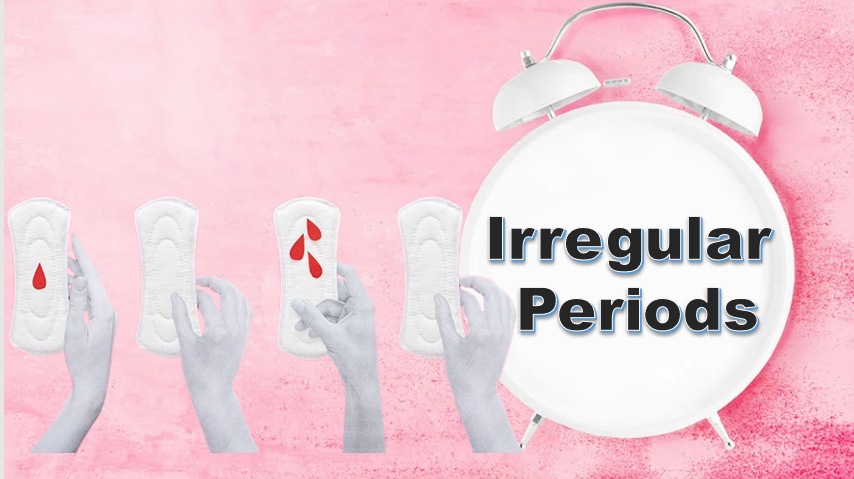The problem of irregular periods (menstruation) in women has become common nowadays. The biggest reason for this is today’s lifestyle and apart from this, there are also hormonal imbalances, medical conditions, medications, and contraceptives.
Irregular periods are also called menstrual irregularities. It refers to changes in the menstrual cycle that are different from normal timing, flow, and symptoms.
Menstrual Cycle Overview
The menstrual cycle typically lasts between 21 and 35 days, with menstruation (bleeding) lasting between 2 and 7 days. A regular cycle involves coordinated hormonal interactions that prepare the body for a possible pregnancy. Irregular periods occur when there is a disruption in these hormonal patterns.
Irregular periods Reasons
- Lifestyle factors
- Stress: High-stress levels can affect the hypothalamus, affecting hormone production.
- Weight fluctuations: Both significant weight loss and gain can affect menstrual regularity.
- Exercise: Excessive physical activity can cause missed periods or irregular cycles.
- Hormonal imbalances
- Polycystic ovary syndrome (PCOS): A common condition in which multiple cysts form on the ovaries, leading to hormonal imbalances and irregular menstruation.
- Thyroid disorders: Both hyperthyroidism and hypothyroidism can disrupt the menstrual cycle.
- Hyperprolactinemia: Elevated levels of the hormone prolactin produced by the pituitary gland can interfere with menstruation.
- Medical conditions
- Endometriosis: A condition in which tissue similar to the lining of the uterus grows outside the uterus, causing irregular bleeding.
- Pelvic inflammatory disease (PID): An infection of the reproductive organs that can cause irregular menstruation.
- Uterine fibroids: Noncancerous growths in the uterus that can cause heavy or irregular bleeding.
- Medications and contraceptives
- Hormonal contraceptives: Birth control pills, patches, injections and intrauterine devices (IUDs) can affect menstrual regularity.
- Medications: Certain medications, such as anticoagulants and antipsychotics, can affect the menstrual cycle.
How to Fix irregular periods naturally?

Irregular menstruation can be brought on time by many natural remedies and lifestyle changes, such as improving diet, yoga and exercise, herbal treatment, lifestyle changes, etc.
- Improving diet
- Balanced diet: Include fruits, vegetables, whole grains, and protein-rich foods.
- Iron and folic acid: Increase your intake of iron-rich foods (such as spinach, broccoli) and folic acid-rich foods (such as legumes, green leafy vegetables).
- Hydration: Drinking enough water is also important.
- Yoga and exercise
- Regular exercise: Regular physical activity helps maintain hormonal balance in the body.
- Yoga and meditation: Practice yoga and meditation to reduce stress, as stress can affect menstruation.
- Herbal remedies
- Ginger: Consuming ginger can reduce pain and irregularities during menstruation.
- Cinnamon: Consuming cinnamon can make menstruation regular.
- Aloe vera: Aloe vera juice can help correct hormonal imbalances during menstruation.
- Lifestyle changes
- Stress management: Try stress-reducing measures such as meditation, deep breathing, and time management.
- Sleep: Getting enough sleep is also important, as good sleep helps maintain hormonal balance.
- Other measures
- Hygiene: Take care of personal hygiene.
- Doctor’s advice: If menstruation is highly irregular, consult a physician.
Other ways to fix Irregular Periods
Women who have the problem of irregular periods or absence of periods should consume women’s health tonic with some such herbs, which improve the reproductive system and provide complete protection to the body by strengthening the immune system.
Such as Ashoka herb, Lodhra, Guduchi, Shatavari, Kumari & Chandan, Musta & Daruharidra, Anantamul, Kakamachi (Makoya), Vasaka & Babbula, Manjistha & Punarnava, Ashwagandha.
Note: Adopting these remedies can help to cure irregular menstruation naturally. However, if the problem is severe or persists for a long time, it is necessary to consult a doctor.
- Ashoka
This herb improves the uterine muscles and endometrium, thus providing relief from abdominal pain and other types of cramps. Its medicinal properties are useful in irregular menstrual cycles, amenorrhea, leucorrhoea, fibroids, ulcers and many other related disorders. - Lodhra
The bark of the Lodhra tree is especially beneficial in controlling uterine problems, bleeding and digestive problems. It relaxes the uterine tissues and relieves inflammation of the female reproductive system by purifying the blood and improving intestinal health. - Guduchi
The main function of this medicine is to strengthen the immune system, apart from this it helps in improving physical health and making it better again. - Shatavari
Shatavari is the best medicine for leucorrhoea. Its anti-oxidant, anti-inflammatory and immune-boosting properties also provide relief from menstrual cramps. - Musta and Daruharidra
The medicinal combination of these two relieves menstrual problems. Their medicinal effect improves the functioning of the urinary tract. - Anantamul, Kakamachi (Makoya), Vasaka, and Babbula
All these medicines together show anti-oxidant properties that nourish the reproductive system by making it healthy. - Manjistha and Punarnava
Both Manjistha and Punarnava are beneficial medicines for inflammation of the uterus and menstrual irregularities. - Ashwagandha
Ashwagandha helps in increasing muscles and strength by providing nutrition to the body, thereby removing physical weakness.
